
On MARCH 19, 2024
Self-service Knowledge Base | What is It and How to Create
Self-service knowledge base (KB), a powerful resource that empowers users to find answers independently, has recently played a crucial part in excellent customer support. As businesses strive to meet the evolving needs of the customers, the implementation of a self-service knowledge base has become a strategic imperative.
To help businesses get a better grip on self-service KB and gain competitve edge, we will walk you through
- Self-service knowledge base definition,
- Guide to creating self-service KB,
- Significance of self-service portals,
- Best practices of customer service knowledge base,
- Examples of support knowledge base,
- FAQs about knowledge base for customer support.
Let's get the show on the road!
What is A Self-service Knowledge Base?
A self-service knowledge base is an online repository of information, resources, and solutions that empower users to find answers to their questions and resolve issues independently.
Basically, a self-service knowledge base serves as a centralized platform where your prospects or clients can access a wealth of articles, guides, FAQs, tutorials, and troubleshooting tips without the need for human intervention.
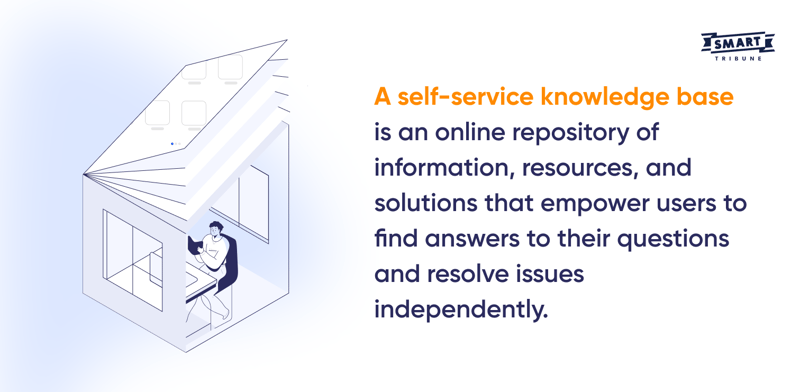
By providing a customer self-service option, businesses empower their customers to take control of their experience, offering convenience and efficiency at their fingertips.
Discover Customer self-service: Best practices, examples, and tips.
How to Create a Self-service Knowledge Base for Your Business?
Since knowledge bases for customer support have an integral part to play in ensuring customer satisfaction, businesses should quickly adopt this cutting-edge technology. Let's delve into the steps to create a self-service knowledge base that enhances the customer experience and drives success for your business.
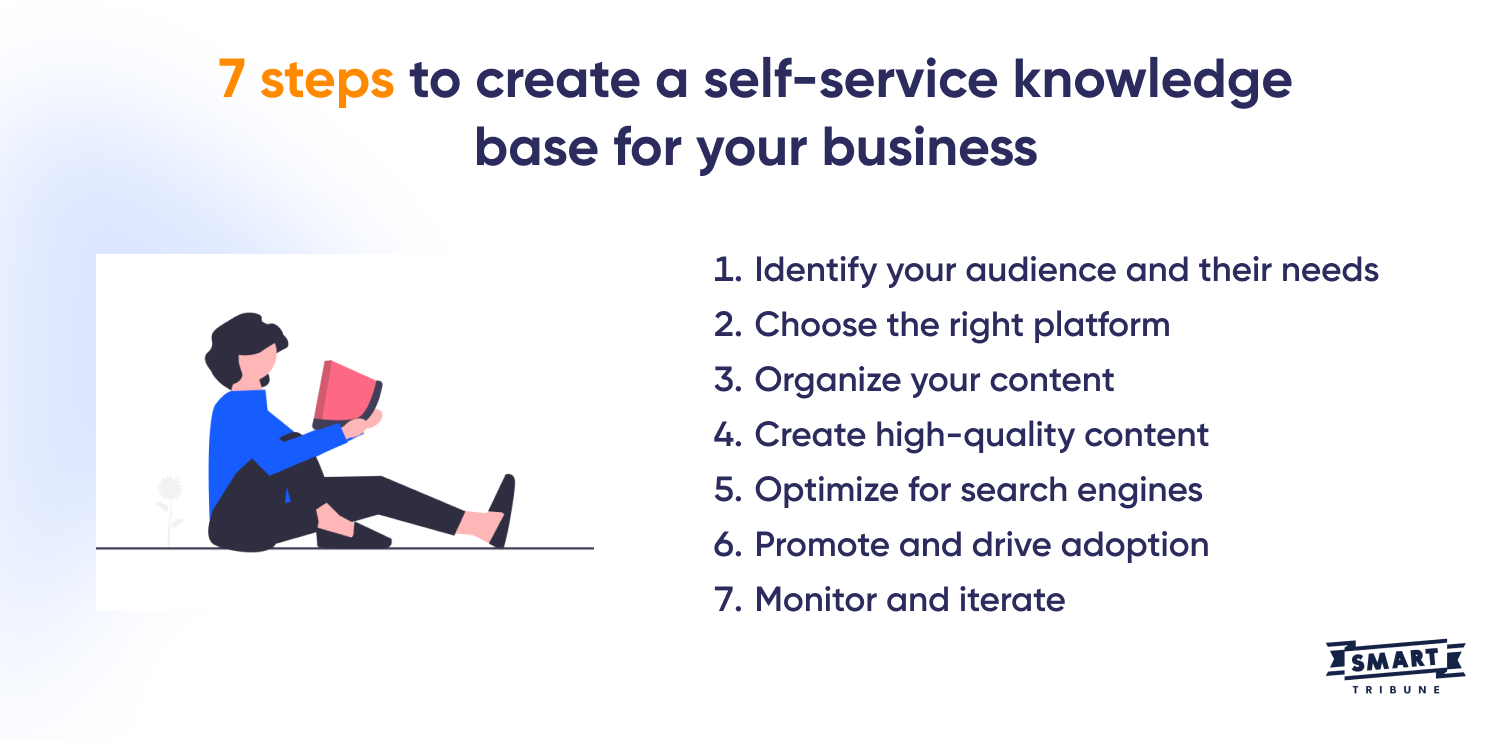
Identify your audience and their needs
Before creating a self-service knowledge base, it's essential to understand your audience and their specific needs. The person in charge or knowledge manager should take the following tasks into account:
- Conduct market research,
- Gather customer feedback,
- Analyze support tickets
to identify common queries, pain points, and areas where customers may need assistance.
Choose the right platform
Selecting the right platform for your self-service knowledge base is crucial. Key factors to be considered are:
- Ease of use,
- Customization options,
- Scalability,
- Integration capabilities.
Checking all the boxes above, Smart Knowledge stands out as an award-winning knowledge management tool. Not only renowned for robust functionalities, usability, customisability, and ranges of supported integrations, Smart Knowledge gains trust and prevalence by offering AI knowledge management assistant, Smart AI.
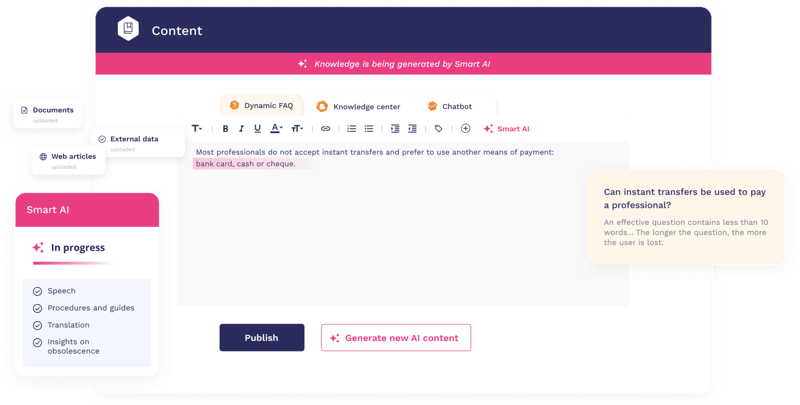
With Smart AI, knowledge managers can generate FAQs or troubleshooting articles within minutes with great accuracy and relevance.
If you're looking for a feature-rich knowledge management solution to uplift customer self-service experience, give Smart Tribune a whirl today.
Organize your content
Organizing your content in a logical and intuitive manner is key to ensuring that users can easily find the information they need.
Businesses can facilitate the searching process by creating categories, subcategories, and tags to classify content and make it searchable. Utilising clear and descriptive titles and headings to guide users through the knowledge base is also an essential step.
Create high-quality content
The success of your self-service knowledge base hinges on the quality of your content. Write clear, concise, and informative articles, guides, FAQs, and tutorials that address common customer questions and issues. Use multimedia elements such as images, videos, and infographics to enhance understanding and engagement.
Dig deep into the A-Z guide to generating knowledge base article with handy tips and editable templates.
Optimize for search engines
To ensure that your knowledge base is easily discoverable by users, optimize your content for search engines.
You can start with conducting keyword research to identify relevant search terms and incorporating them into your content, titles, and meta descriptions. Don't forget to use descriptive URLs and optimize image alt tags for better visibility in search results.
Promote and drive adoption
Promote your self-service knowledge base across your website, social media channels, email newsletters, and support interactions to drive adoption. Encourage customers to use the knowledge base by highlighting its benefits, such as faster resolution times, 24/7 availability, and empowerment.
Monitor and iterate
Once your self-service knowledge base is live, monitor its performance regularly and gather feedback from users. Track metrics such as search queries, content engagement, and user satisfaction to identify room for improvement. Iterate on your content and structure based on user feedback and evolving customer needs.
That's all about building a self-service knowledge base. Organisations should create a knowledge base that empowers customers, enhances their experience, and sets businesses apart from the competition.
The Benefits of Self-service Knowledge Base
Doubtlessly, the ever-evolving needs of customers lead to a remarkable transformation in customer experience and their expectation towards businesses' customer service. Customers are now expecting real-time support and proactive access to knowledge more than ever. It's when customer self-service comes in handy; let's delve into the radical reasons why more and more firms are building a knowledge base.
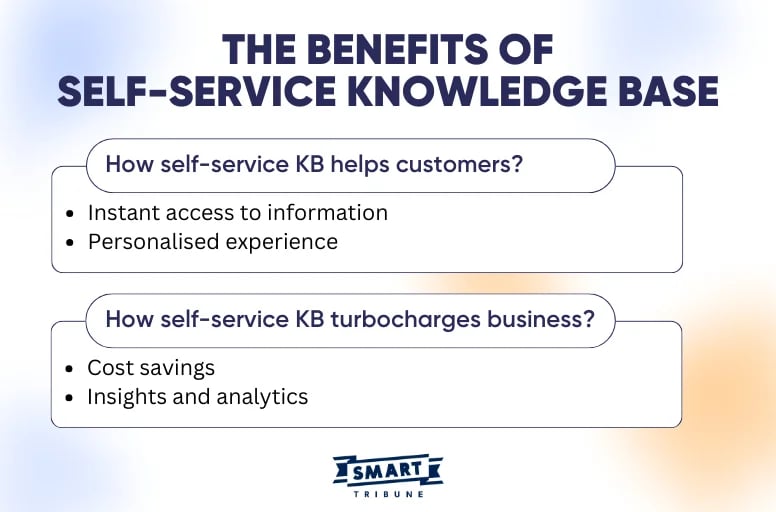
How self-service KB helps customers
Instant access to information
Self-service knowledge bases empower customers with instant access to information and support resources, reducing the need for lengthy wait times and frustrating phone calls.
With a few clicks, customers can find solutions to their inquiries, troubleshoot issues, and learn how to make the most of products or services, all at their convenience.
This accessibility not only saves time but also fosters a sense of independence and empowerment among customers, leading to greater satisfaction and brand loyalty.
Personalised experience
A self help knowledge base offers a personalised and tailored experience for customers. By providing targeted content and resources based on user queries and preferences, this sort of self service knowledge base software ensures that customers receive relevant and timely assistance, bolstering their overall experience and engagement with the brand.
Uncover more customer service trends in 2024 to quickly make your prospects fall in love with your brand.
How self-service KB turbocharges business
Cost savings
The edges of self-service knowledge bases extend beyond customer satisfaction—they also offer significant advantages for businesses. One of the most notable benefits is the reduction in support costs.
By deflecting routine inquiries and issue resolution to self-service platforms, businesses can significantly lower the volume of support tickets and calls, freeing up resources and personnel to focus on more complex or high-priority issues.
Apparently, leveraging self-service KB not only boosts operational productivity but also lowers support resources, resulting in tangible savings for the business.
For instance, Groupe Bayard, a major multimedia publishing group in France, reduces 10% of average handle time (AHT) by adopting self-service KB, which ultimately contributes to lower support costs and ROI improvement.
Insights and analytics
Typically, a knowledge management platform enables organisations to gather valuable data about customer behavior, preferences, and interactions with it. By analyzing this data, businesses can gain deep insights into various aspects of their customer support operations:
- Understanding customer's needs: identify common pain points, frequently asked questions, and areas where customers may be struggling to find information
- Optimizing content: determine which articles, guides, or tutorials are most popular and helpful to customers to create more content that resonates with customers and update or remove less effective content.
- Improving search functionality: analyzing search queries in order to optimize search algorithms, add relevant keywords, and organise content in a way that makes it easier for customers to find what they're looking for.
- Identifying trends: tracking trends in customer behavior and content usage over time to identify emerging patterns and trends that may impact customer support operations. This insight allows businesses to stay ahead of the curve and proactively address issues before they escalate.
Uncover more ins and outs of customer self-service:
- The Power of Customer Self-Service for Driving Conversions Along the Purchase Journey,
- Insurance: 6 Keys to Improving Customer Service With Self-service Solutions,
- How Customer Self-Service Can Come to the Rescue During a Crisis,
- Win Big This Year's Holiday Shopping Season.
Self-service Knowledge Base Best Practices
Creating an effective knowledge base requires more than just compiling information. It requires careful planning, thoughtful design, and strategic implementation. Let's explore some best practices for building a self-service knowledge base that delights users and drives success.
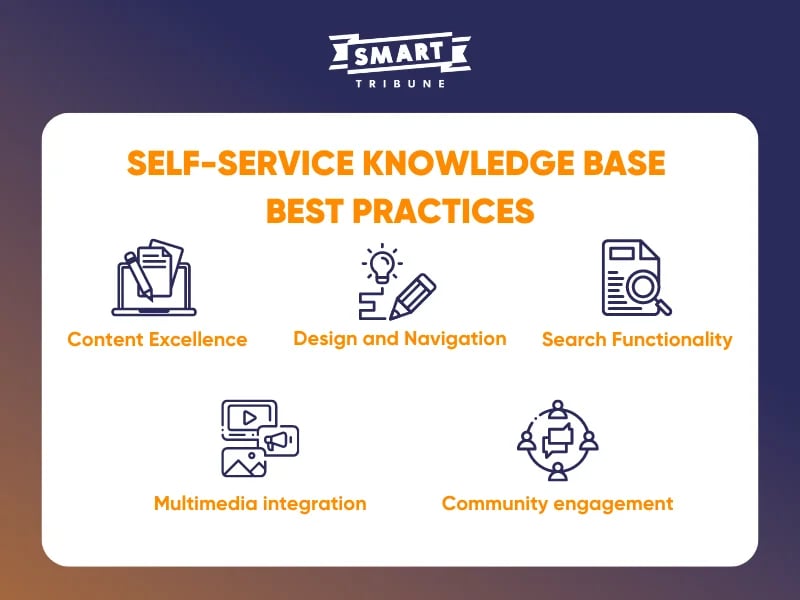
Content excellence
Keep it clear and concise
Write content in a clear and concise manner, avoiding jargon or technical language that may confuse users. Use simple language and provide step-by-step instructions to guide users through troubleshooting processes or product features.
Update regularly
Regularly update your knowledge base with new content and information to ensure that it remains relevant and up-to-date. Monitor customer feedback, support tickets, and product updates to identify areas where new content is needed.
Design and navigation
Create intuitive navigation
Design the navigation of your knowledge base to be intuitive and easy to use. Organize content into logical categories and subcategories, and provide clear pathways for users to navigate to relevant information.
Ensure mobile-friendly design
Ensure that your knowledge base is optimized for mobile devices, as many users may access it from smartphones or tablets. Use responsive design principles to ensure that content displays correctly and is easily navigable on smaller screens.
Search functionality
Enable powerful search bar
Implement a powerful search bar that allows users to quickly find the information they need. Include features such as
- Autocomplete suggestions,
- Advanced search filters allow users to refine their search results based on criteria such as content type, date, or relevance
- Natural language processing (NLP) to improve search accuracy and efficiency.
The aforementioned functions help users narrow down their search and find the most relevant information more quickly.
Learn more about Semantic analysis in customer support.
Optimise keywords
Use relevant keywords and phrases throughout your content to improve search engine visibility and make it easier for users to find what they're looking for.
Multimedia integration
Use visuals wisely
Incorporate visuals such as images, videos, and infographics to enhance understanding and engagement. Visuals can help clarify complex concepts or procedures and make content more engaging and memorable for users.
Smart Knowledge even goes the extra mile by supporting diverse content formats to make sure that users can seek the wanted information with ease. Knowledge creators can seamlessly add:
- Summaries,
- Accordions,
- Images/videos,
- GIF,
- Tables,
- Decision tree,
- PDF documents.
Make content accessible
Ensure that all content in your knowledge base is accessible to users with disabilities. Provide alternative text for images, and captions for videos, and ensure that content is formatted in a way that is easy to navigate with screen readers.
Community engagement
Harness user feedback mechanisms
Implement user feedback mechanisms such as ratings, comments, or surveys to gather feedback from users about the usefulness and relevance of content. Use this feedback to identify areas for improvement and prioritize content updates.
Hold community forums
Create community forums or discussion boards where users can ask questions, share tips, and engage with other users. Community forums foster a sense of community and collaboration among users, empowering them to help each other and share knowledge.
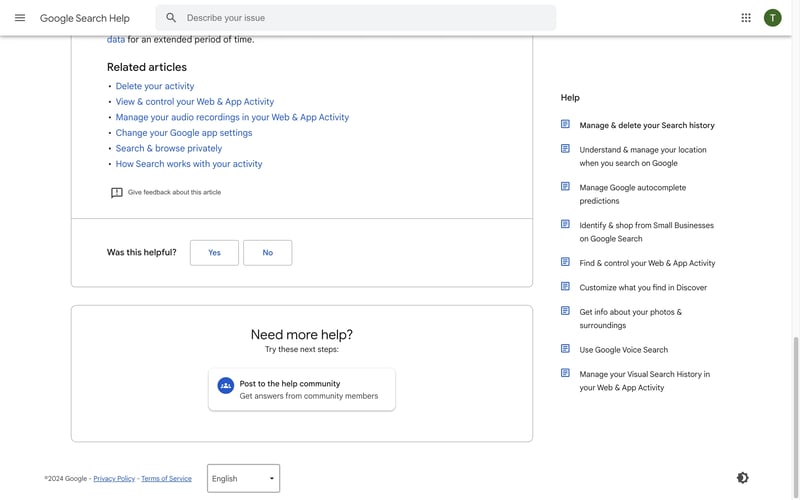
Self-service Knowledge Base Examples
Before kicking off creating a KB for business use, decision-makers should scan various excellent self-service knowledge base examples to pick up content, functionality, design and other related insights. Among top +100 best knowledge base examples, we have picked 2 cases that create incredibly exhilarating customer self-service experiences. Let's learn from the juggernauts.
TotalEnergies 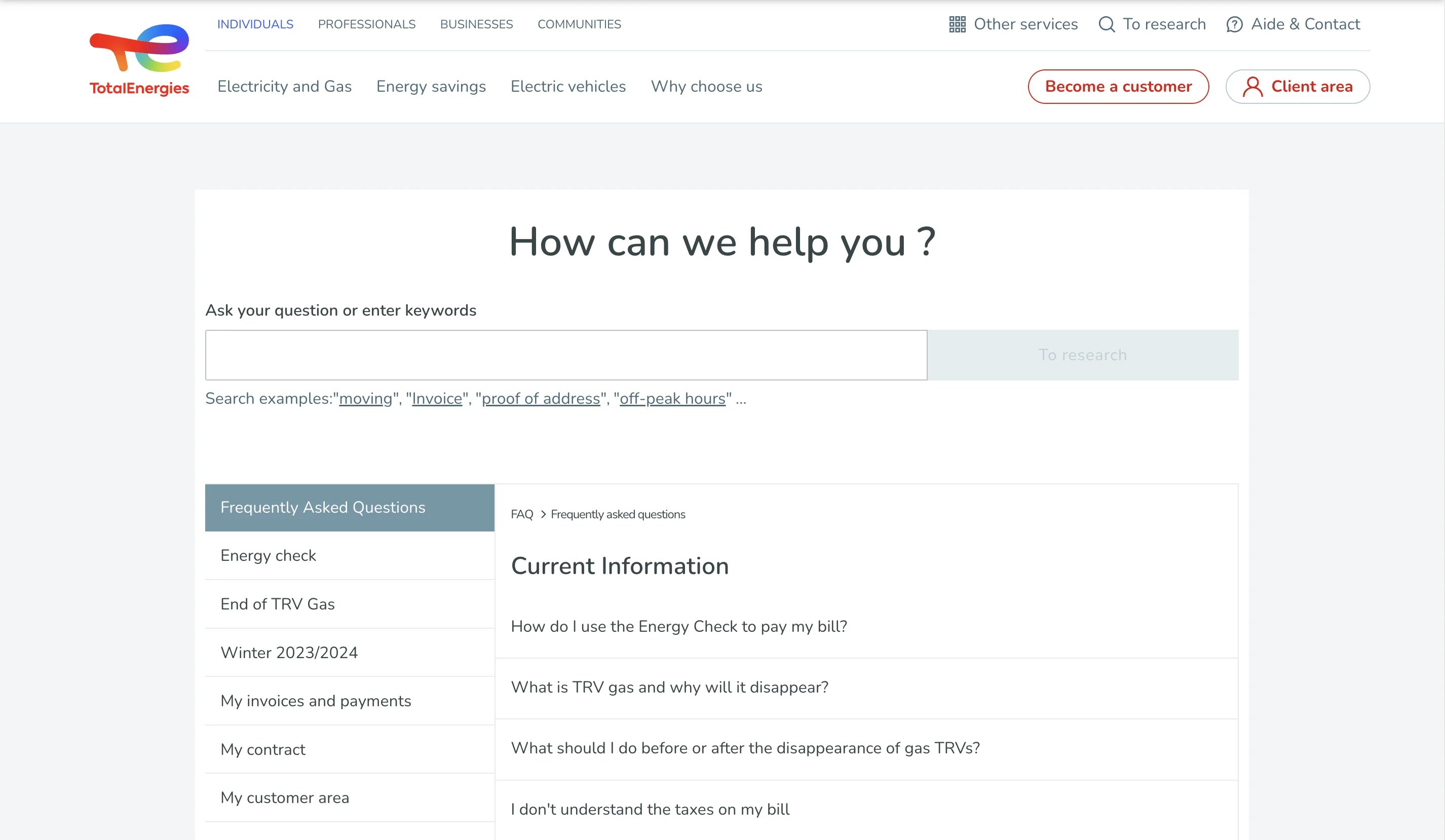
TotalEnergies offers a self-service knowledge base through its online support portal, providing customers with access to a comprehensive repository of resources and information related to its products and services.
Within the knowledge base, users can find detailed articles, guides, and FAQs covering various topics such as energy solutions, sustainability initiatives, and safety guidelines.
Amazon Help Center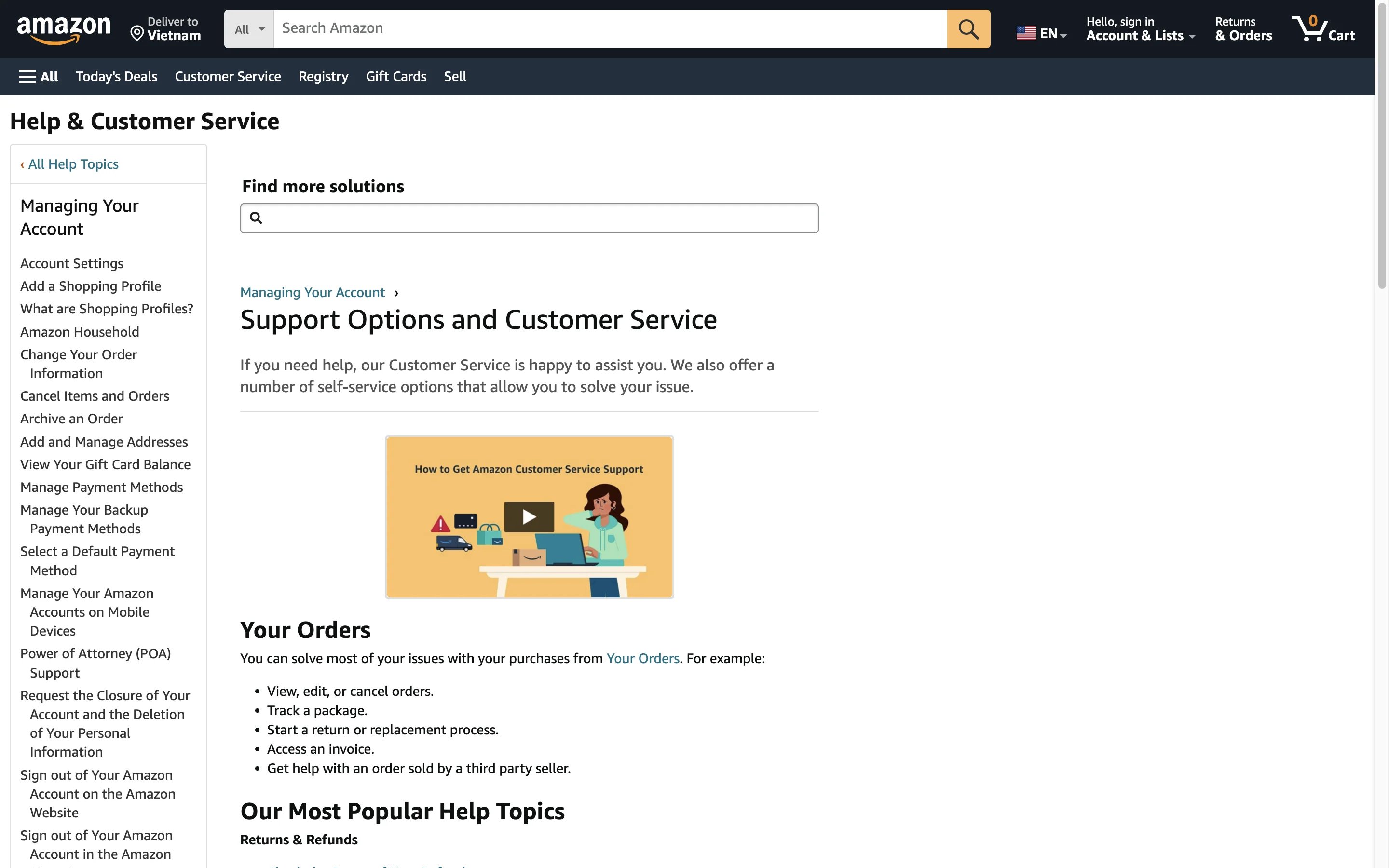
Amazon's Help Center serves as a self-service knowledge base for customers seeking assistance with their purchases, account settings, and general inquiries. The Help Center provides users with access to FAQs, video tutorials, and step-by-step guides to help them navigate the platform, resolve common issues, and make the most of their Amazon experience.
Additionally, users can access community forums and customer support resources for additional assistance.
Customer self-service is not all about solely knowledge base, it does include Chatbot and FAQs pages. That's why Smart Tribune's ecosystem stands out from the crowd for empowering businesses to disseminate initial knowledge through KB, chatbot and dynamic FAQs page.
Dive deep into the customer self-service world:
- Dynamic FAQ: Definition, Benefits, Use Cases
- 9 Top-notch FAQ Page Examples | Benefits, Best Practises And How To Create FAQ Page
- All About Chatbot Use Cases That You Need to Know (2024)
- 9 Practices of Lead Generation Chatbot That Hit The Mark
- Dynamic FAQs or Chatbot?
FAQs about Self-service Knowledge Base
1. What is self service?
Self-service in customer service refers to empowering customers to seek information and complete tasks independently, without the need for direct assistance from a support agent. It typically involves providing customers with resources such as knowledge bases, FAQs, tutorials, and online tools to help them resolve their queries or concerns on their own.
2. What is knowledge base?
A knowledge base or KB is a centralized reservoir of information, resources, and documentation that provides users with access to relevant content to help them find answers to their questions, troubleshoot issues, or learn more about a product or service.
Bottom Line
A self-service knowledge base is a powerful tool that empowers customers to find solutions independently, reduces support costs, and enhances overall satisfaction. By implementing best practices in content creation, design, search functionality, multimedia integration, and user engagement, businesses can create a knowledge base that meets the needs of users. Embracing self-service capabilities not only streamlines support processes but also demonstrates a commitment to customer empowerment and excellence in service delivery.
Hope that after reading this article, you are ready to take customer support to new heights by creating a robust knowledge base with the involvement of the leading customer self-service solution, Smart Tribune. Should you have any further inquiries related to KB, drop us a line for assistance.



.png)



